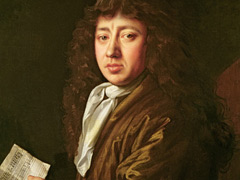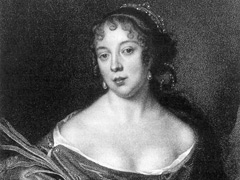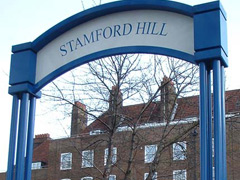


While Pepys held important roles in the government and the navy throughout his career, he is best remembered for his legendary diaries, which offer a detailed account of 17th century London that historians refer to time and time again. Over the course of nine years Pepys chronicled a period of huge change in Britain and its capital city, not leaving out the salacious activities of the court of Charles II and the most infamous brothels of the era.
Pepys was born in 1633 to a middle class family, the son of a tailor. Although they lived in the city, the young Pepys was sent to live in the countryside after two of his brothers died of the Plague. He attended Huntingdon Grammar School, which also counted Oliver Cromwell, future political leader, as a pupil.
At Cambridge he got into trouble for excessive drinking, but misdemeanours like this one wouldn’t cause him long term problems as he was fortunate enough to have rich relatives, including his cousin the Earl of Sandwich, who gave him his first job as a clerk.
In 1660 he began his diaries. It is not known what the motive was for him to start documenting his day to day life, but it seems he didn’t want anyone to read them, as he used a form of shorthand that took a poor scribe seven years to decode. When describing some of his more sordid pastimes he wrote in a different language, often French.
The ultra-conservative Cromwell died shortly before Pepys’ began his journals. Working for the government meant he had first-hand knowledge of the goings-on of the court. The coronation of Charles II was a massive party that summed up the following two years of his reign, of which he wrote: “We drank the King's health and nothing else, till one of the gentlemen fell down stark drunk and there lay speweing. And I went to my Lord's pretty well. But no sooner a-bed with Mr Sheply but my head begun to turne and I to vomitt, and if ever I was foxed it was now - which I cannot say yet, because I fell aleep and sleep till morning - only, when I waked I found myself wet with my spewing.” [sic] A good night then.
\n\nHe recorded the Anglo-Dutch War of 1665-1667, and the Great Plague. This entry dated August 31st 1665 reveals the staggering number of deaths claimed by the disease so far: “Up, and after putting several things in order to my removal to Woolwich, the plague having a great increase this week beyond all expectation, of almost 2000 - making the general Bill 7000, odd 100 and the plague above 6000. Thus this month ends, with great sadness upon the public through the greateness of the plague, everywhere through the Kingdom almost. Every day sadder and sadder news of its increase. In the City died this week 7496; and all of them, 6102 of the plague. But it is feared that the true number of the dead this week is near 10000 - partly from the poor that cannot be taken notice of through the greatness of the number, and partly from the Quakers and others that will not have any bell ring for them.”
His account of the Great Fire gives readers a very good idea of the scale of the catastrophe. “So down [I went], with my heart full of trouble, to the Lieutenant of the Tower, who tells me that it began this morning in the King's baker's house in Pudding Lane, and that it hath burned St. Magnus's Church and most part of Fish Street already. So I rode down to the waterside, . . . and there saw a lamentable fire. . . . Everybody endeavouring to remove their goods, and flinging into the river or bringing them into lighters that lay off; poor people staying in their houses as long as till the very fire touched them, and then running into boats, or clambering from one pair of stairs by the waterside to another. And among other things, the poor pigeons, I perceive, were loth to leave their houses, but hovered about the windows and balconies, till they some of them burned their wings and fell down.”
\n\nBy the end of the 1660s Pepys was rich thanks to an advisory role in the navy which resulted in the number of ships owned by the British Empire almost doubling by 1689. His career went from strength to strength, as did his position in society. He held titles like Master of the Clothworkers’ Company and Master of Trinity House.
Pepys had a love of the theatre and of drinking. He frequented prostitutes and was very open about his hapless shenanigans, whether they involved persuading servants to let him touch their breasts or visiting the bawdy houses of Ratcliffe Highway.
He married Elizabeth St. Michel, the daughter of a Huguenot exile, in 1665; she was 14 at the time. It was practically a chaste relationship, although while his affairs caused rows and disruption, he loved her very much. Elizabeth died at the age of just 29 in 1669, and Pepys never remarried.
His eye strain stopped him from writing in 1669, but his diaries have a lasting impact. They weren’t published till the 1800s, and even then some of the more graphic descriptions of his liaisons were not made public until the 20th century.
Pepys passed away in 1703, and is buried at St. Olaves near Tower Hill, next to his wife and one of his brothers. As well as his diaries, he left behind a vast collection of books, theatre tickets, and the biggest collection of 17th century English ballads in existence, a fitting legacy for the unintentional raconteur.


